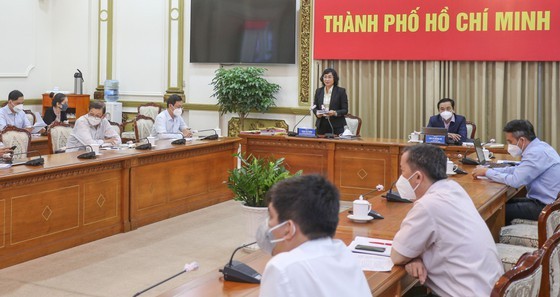 Ms. Phan Thi Thang, Vice Chairwoman of Ho Chi Minh City People's Committee, speaks at the Vietnam-EU Trade Forum in 2021 titled "EVFTA – Leverage for Trade and Investment Cooperation in the New Normal’. (Photo: SGGP)
Ms. Phan Thi Thang, Vice Chairwoman of Ho Chi Minh City People's Committee, speaks at the Vietnam-EU Trade Forum in 2021 titled "EVFTA – Leverage for Trade and Investment Cooperation in the New Normal’. (Photo: SGGP)
Turnover increased by more than 13 percent
Looking at the European market, Deputy Minister of Industry and Trade Dang Hoang An emphasized that the EU-Vietnam Free Trade Agreement (EVFTA) has been bringing advantages to the exports of the two sides. Currently, the EU has identified Vietnam as one of the ten countries with the largest export turnover to the EU. Only from the beginning of the year to now, although Vietnam has faced many difficulties due to the complicated developments of the Covid-19 pandemic, the two-way export turnover between Vietnam and the EU has reached US$41.3 billion, up 13.4 percent compared to the same period last year. Of which, Vietnam's export turnover to the EU has touched VND28 billion. Ms. Phan Thi Thang, Vice Chairwoman of Ho Chi Minh City People's Committee, affirmed that the EU was not only an export partner but also a major foreign investment partner in Vietnam. In HCMC alone, the total number of EU investment projects in the city had reached 1,019 by the end of September this year, with a total investment capital of $3.56 billion. From the beginning of the year until now, despite difficulties, 84 European enterprises have still made investments, with a total capital of more than $100 million. Assisting businesses to keep pace and expand market share in Europe is one of the current urgent solutions of HCMC in particular and the country in general. According to Ms. Phan Thi Thang, with the Covid-19 vaccination coverage of 98.3 percent of the first dose and 74 percent of the second dose, the city has gradually controlled the pandemic. It is the basis to support enterprises to resume production and business activities and recover the economy. Along with that, the city has been promoting regional cooperation activities with other provinces, including Binh Duong, Dong Nai, Tay Ninh, Long An, and Ba Ria - Vung Tau, at the same time helping businesses to improve competitiveness and product quality. Support solutions focus on the key factor to help businesses access the maximum advantage of tax incentives from the EVFTA. Ms. Phan Thi Thang added that HCMC has had many policies to attract foreign enterprises to invest in sectors, such as building logistics centers, developing smart cities, and manufacturing high-tech products.Updating and simplifying export procedures At the forum, Mr. Giorgio Aliberti, Ambassador, Head of the Delegation of the EU to Vietnam, also frankly said that through the feedback of some businesses in the EU, the quality of Vietnamese goods faced certain limitations when entering the EU market. The most common issue was the unstable quality of goods. The quality of samples and delivered goods was different, or the product quality was uneven among shipments. Vietnamese goods often failed to pass the technical barriers of food safety and hygiene of the EU. Many delegates analyzed that because Vietnamese enterprises buy raw materials from many places, the quality is uneven. The planning and management of growing areas are not strict, so many exported agricultural and aquatic products still have residues of banned active ingredients or concentrations of pesticides higher than the allowed limit and do not meet the food safety standards. At present, some EU countries, such as Spain, Austria, Switzerland, and Norway, have put a few Vietnamese agricultural and seafood products under supervision. Although the warning status is “not critical”, Vietnamese businesses need to overcome quickly to avoid the risk of closing the market in this area. Exporting goods to a fastidious and high-standard market like the EU is a really tough competition. To keep pace with the export market in the EU, Mr. Alain Cany, President of EuroCham, suggested that Vietnamese enterprises need to overcome shortcomings in the traceability of goods, packaging design, trademarks, and the tastes of consumers in the importing country. These shortcomings have been reducing the competitiveness of Vietnamese goods in the EU market. Vietnamese exporters need to actively shift production to green and clean products that meet the GlobalGAP standards, ensuring environmental protection, and those with trademarks associated with intellectual property rights on geographical indications. On the other hand, Vietnamese businesses said that the Delegation of the EU to Vietnam, EuroCham, and diplomatic missions of EU member countries in Vietnam should closely coordinate with the Vietnamese authorities, assist in updating information about the business environment in the EU for Vietnamese businesses. Along with that, businesses also asked the Ministry of Industry and Trade to coordinate with ministries, central agencies, and relevant EU agencies to study and perfect cooperation policies towards simplifying import and export procedures, especially the procedures for the certificate of origin, to create the most favorable conditions for import and export activities between Vietnam and the EU.
HCMC continues to implement the logistics industry and export development projects to 2025 with an orientation to 2030. For the project on developing the logistics industry, the city will implement regional linkages and closely connect with the provinces of the Southeast and Southwestern regions. For the export development project, the city will focus on investing in export support services. The city will play the role of a center providing export services for the Southern provinces and cities. Moreover, the city will promote the program to develop supporting industries, helping to connect small and medium-sized enterprises in the area with global production and supply chains, including EU enterprises, to increase their on-site export capacity.
























